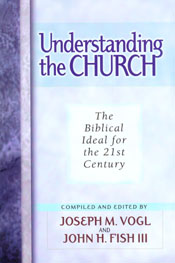Well into this side of the millennial threshold, wading through the deepening waters of change, the issue of reexamining the nature and future of the church is foremost on the minds of theologians, church educators, ministers, and denominational leaders. What will the church look like at the midpoint of the next century? Will the structure of the church require change to survive? Will the mission and functions of the church change? Will the institutional church survive its own success or succumb to a structure too rigid to adapt to the winds of change?

Understanding the Church: The Biblical Ideal for the 21st Century, compiled and ed. by Joseph M. Vogl and John H. Fish III (Neptune, N.J.: Loizeaux Brothers, Inc., 1999) sidesteps contemporary conversations of the sociological dynamics of the church or the usual speculation as to generational shifts within the body. Being a compilation of papers presented at a 1997 colloquium at Grace Bible Chapel in St. Louis, Missouri, the book reviews basic questions about the nature, structure, and functions of the church. The seven essays that make up the chapters of the book do not stray far from the biblical text for interpretations and prescriptions on rudimentary questions about the church from a strictly Protestant theology.
The book begins with an almost apologetic chapter on the necessity of maintaining the primacy of Scripture in understanding the nature of the church and any interpretations as to her form and function. This foundational chapter limits its understanding of the church not only to a Protestant theology, but more, to that of the Brethren Church (and even narrower, the Open Brethren, at that). This self-limited understanding of the nature of the church is the book’s greatest weakness.
The following chapters explore further the nature of the church from a strictly biblical theology, and issues of the identity, nature, and character of the local church versus the universal church. The final two complementary chapters examine issues concerning the autonomy and the interdependence of local churches.
Rather than providing a new vision for the church in the 21st century, the book offers up a 19th century conservative evangelical biblical theology of the church typical of what would be found in a sophomore year systematic theology course at a Bible college. The “biblical ideal†for a 21st century church that appears in the book’s subtitle seems to be a call for a return to an idyllic “first century churchâ€â€”the yearning to return to the days of a fabled ecclesiastical Camelot. Some will find comfort in the certitude that a propositional systematic biblical understanding of the church provides. Unfortunately, such a stance is inadequate in helping churches deal with the overwhelming complexities that the church faces in the 21st century.


Pingback: Book Reviews